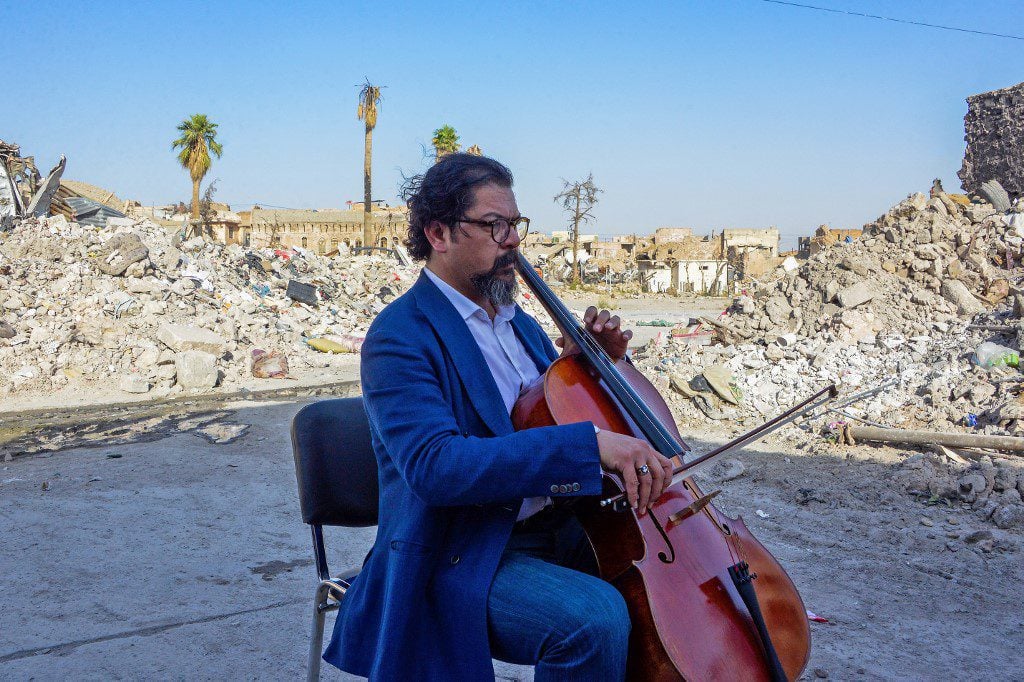
Ali Alajeel
To be a sad Iraqi is not an accusation or a false nihilistic stance. It is a proven historical fact, there is no hint of falsification, and it does not even need clarification. This dominating grief is as old as Iraq, and it has imprinted itself in Iraqi music and songs. That has several reasons, the first of which is a historical one. The Sumerian, Akkadian, and Babylonian myths written on clay tablets speak of the god Tammuz (the god of fertility and growth) falling captive to the underworld. The only way to free Tammuz from his captivity is through the tears of Ishtar. After the goddess of love and beauty wails, cries and recites elegies for days every year, Tammuz would finally be liberated. At that time, Ishtar says: “For Tammuz, the beloved of youth, I spent year after year crying and wailing.”
The land and the climate also had a vast impact on the psychology and music of Iraq. By nature, the ancient Iraqi was ill-equipped for war. Therefore, he was constantly invaded and plundered by mountain dwellers from the east or tribes from the west. In addition, the Tigris River was terrifying and dangerous, and it was a source of fear and anxiety for the ancient Iraqis. Dr Ali Al-Wardi says in this regard: “Sadness has been a part of the Iraqi personality for thousands of years. The composition of the Iraqi culture is a result of economic activity, as the land of Iraq is a rich and fertile land. However, abnormal circumstances might suddenly emerge and control everything. For example, the flood in Iraq occurs during abundant harvest, while the one of the Nile occurs while throwing the seeds. Therefore, the flood of the Nile is good, and the floods in Iraq are a curse, so Egyptians could rejoice while Iraqis have to grieve.”
Finally, there is the tragedy of the murder of Al-Husayn. His martyrdom became a feature of Iraqi grief since he watered the soil of Karbala with his blood to uphold the word of truth. Since that day, the processions of collective grief in Iraq have been endless, adding a beautiful voice only to divert its course.
In the end, the Iraqi thought that the magic key to liberation from suffering in the struggle with the gods and nature comes through grief, mourn and lamentation. He thus emulates the historical myth of Adapa. The legend says that Adapa, the son of the god of wisdom Ea, broke the wing of the south wind, so the great god (Anu) noticed this and ordered to bring Adapa before him. It was then that Ea advised his son. He told him to wear mourning garments and not to tidy his hair. When he reaches the gate of heaven, he will find that the gods Tammuz and Gishzida guard it. When they ask him why he wears mourning garments, he must answer that the disappearance of two gods from the earth saddens him. And when they ask him who these two gods are, he should answer that they are Tammuz and Gishzida, and this will satisfy their vanity and make them very happy, and they will praise him in front of Anu. And thus, he ensures his salvation.
During the 1970s, several attempts were made in the Iraqi cultural and media circles to remove the Iraqi song from its sad mould. At that time, the organizers of these circles were surprised that the music library was almost empty after removing the sad ones. This library did not take long to be filled with sorrow and pain once again as it was.
The last attempt, almost a year after the end of the Iran-Iraq war, was when the lyric poet Taher Salman from Basra wrote a song entitled Farewell, Sadness, composed by the late artist Talib Al-Qaraghuli and performed by the singer Yas Khidr. In that song lies the irony, as the song begins with the poet’s saying: “Farewell sadness! Do not come back.” However, Yas Khidr, despite his efforts, could not support these words with his voice. As known in previous songs, Khidr was not successful in changing the stereotype of singing in Iraq as his voice was sad. As explained, sorrow remains the identity of the Iraqi and the only key to his salvation.
Sources:
Baqer, T., An Introduction to the Iraq’s Ancient Literature, Baghdad University, 1976, Baghdad (Arabic version).
Al Wardi, A., The Personality of Iraqi Individual, 2nd edition, Daar Laila for publishing, 2001, London (Arabic version)
Alshehilat A., Al-Hamdani A., Briefing on Iraq’s History, Dar Al Kotob Al Ilmiyah, 2011, Beirut (Arabic version).
Al Rafe’i, M., The History of Arab Literature, Al Asriya Library, 1911, Cairo (Arabic version).
Shapiro, M., Hendricks, R., Dictionary of Mythologies, Daar Alaadin for publishing, Damascus, 2008, translated to Arabic by Hanna Abboud (Arabic version)
DISCLAIMER
The opinions expressed in this publication are those of our bloggers. They do not purport to reflect the opinions or views of Fanack or its Board of Editors.


